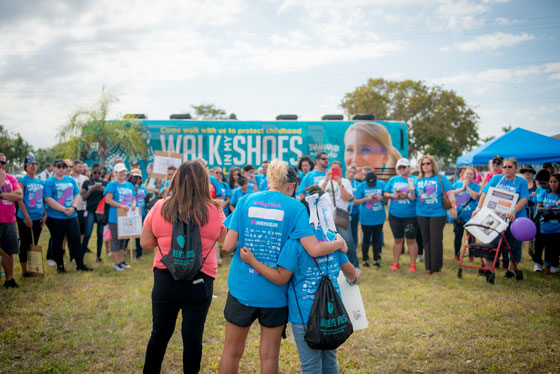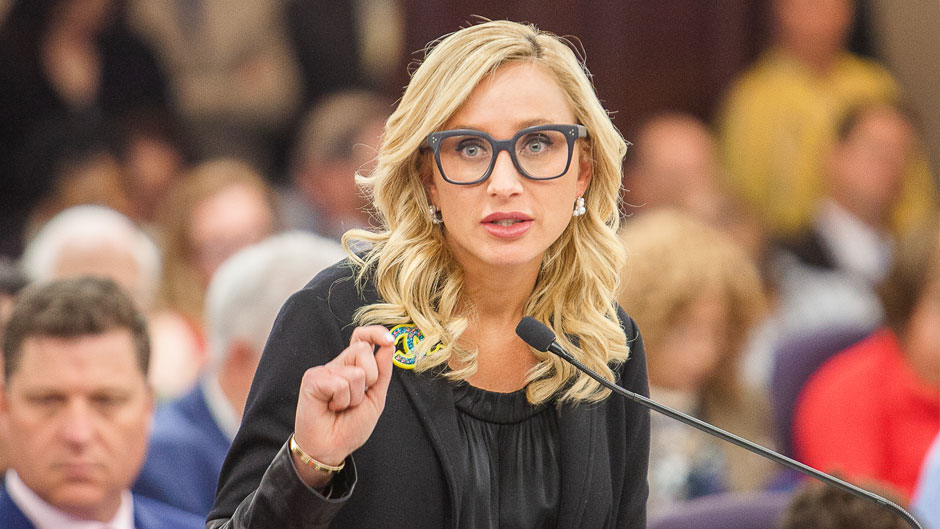As public schools in Florida’s Broward County prepared to reopen with virtual classes in mid-August, the school district warned employees not to share their COVID-19 status in the workplace or on social media.
Issued by the district’s safety chief, the order rankled many educators, but few voiced their objections as loudly and swiftly as Florida Senator Lauren Book. The Plantation Democrat, who is running for reelection in 2022, condemned the “see no evil, hear no evil’’ approach to virus management as “misguided and dangerous.” She demanded the directive be rescinded immediately, and it was.
Silence will never again be an option for Book, one of the nation’s 42 million survivors of childhood sexual abuse who, a day before her 18th birthday, publicly shared the dark secret she had kept from her family for six years. Since then, she has become a powerful and persuasive voice for preventing sexual abuse through education and awareness—an advocacy that formally began in 2007, when she and her father established Lauren’s Kids during her senior year in the University of Miami’s School of Education and Human Development.
“So much of who I am and what I am came from my professors,” said Book, now 35 and the happily married mother of three-year-old twins. “They helped me heal in different ways that I wasn’t in touch with through traditional counseling for trauma. They taught me that I could give kids things that I didn’t have by creating a safe place in a classroom.”

Initially, the nonprofit foundation was little more than a hotline, a toll-free phone number that other victims of childhood sexual abuse could call to confide their shame, their guilt, their fear, and their thoughts of suicide. But in 2010, Book began what quickly became the foundation’s signature Walk in My Shoes trek across Florida. Over the next eight years, she walked thousands of miles from Key West to Tallahassee, stopping at crisis treatment centers, empowering other survivors with her “It’s OK to tell” message, and influencing the passage of more than two dozen state and national laws aimed at protecting children from sexual abuse and helping survivors heal.
Among them: hard-fought battles against the Catholic Church and the Boy Scouts of America to eliminate statutes of limitation for prosecuting sexual assault crimes against children.
Today, the foundation is one of the nation’s most respected child advocacy and resource centers. Its Safer, Smarter Schools curriculum aims to stamp out the staggering statistics Book learned when in 2010 she returned to the University for her master’s degree in community and social change—1 in 3 girls and 1 in 5 boys will be sexually assaulted before they turn 18, and 90 percent of the time their assailant is someone they know, love, and trust.
The curriculum, which teaches kindergarteners through 12th-graders how to recognize unsafe situations, avoid traps set by predators, and speak up if they are being victimized, is propelled by another statistic that most motivates Book—that 95 percent of childhood sexual abuse can be prevented with education and awareness.
At last count, Safer, Smarter Schools was taught in 37 states, including Florida—and through partnerships with UNICEF and Crime Stoppers International—in numerous countries around the world. This expanding reach does not surprise Laura Kohn-Wood. Now the dean of the School of Education and Human Development, Kohn-Wood joined the University in 2009 to implement the master’s degree program in community and social change. She remembers being so impressed with the anti-abuse curriculum that Book developed for preschoolers as a master’s-degree project that she used it with her own young son.
“When I met Lauren, she already was a remarkable and incredibly determined young woman,” Kohn-Wood said. “I marveled at how she had survived this horrific childhood to create this incredible model, which was the genesis for Safer, Smarter Schools. She also had something that is hard to teach—and that is vision. She had this vison for how she could use her experience to create a communal safe space to address issues that happen, figuratively, in the dark. That’s perhaps the biggest gift she’s given us.”
Today, with the novel coronavirus pandemic forcing many school districts to continue reaching students through online instruction, the foundation’s curriculum and the 10 million education and awareness materials it mails annually may be more important than ever. As schools shut down in the spring and summer camps, sports leagues, and other summer programs were cancelled, calls to the Florida Abuse Hotline began dropping. By August, they had plummeted by 26,000, compared to the same time period the year before.
Not for an instant did Book, who chairs the Senate Committee on Children, Families, and Elder Affairs, think children were suddenly safer because they were home. She knew teachers, counselors, physicians, and other frontline defenders against abuse no longer had a watchful eye on children in harm’s way. Lacking the proper personal protective equipment, even state social workers who investigate abuse reports stopped visiting children in their homes. And, as Book knows too well, home is not always a safe harbor.
Her tormenter was her live-in nanny, a beloved best friend/big sister who joined the Book household when Book was 10. From outward appearances, Waldina Flores showered Book with the affection and attention the girl craved, and that Book’s parents were not always available to provide. But behind closed doors, Flores subjected Book to a barrage of sexual, physical, and verbal abuse that continued for six agonizing years—until Book’s boyfriend recognized something amiss and pressed her to tell the truth when they were both 16.
For the next two years, Book fought for her very survival. She struggled with anorexia and barely weighed 80 pounds. Her organs were failing. She was self-mutilating. Yet, in 2002, a few months before Flores was sentenced to 15 years in prison, Book managed the first of what would become annual trips to the state capital with her father, Ron Book, an influential South Florida lobbyist. Together, they quietly pushed the Legislature to amend the law that barred her from learning the results of Flores’ HIV test.
“I was angry. I was sad. I was broken,” Book recalled. “And I was determined to fix it. That was really what propelled me to engage in the process and make a difference for other kids.”
By 2016, when Book successfully ran—unopposed—for her first term in the Florida Senate, there were no visible signs of that broken child. Though she was a freshman Democrat in a Republican-controlled chamber dominated by men, she was a force to be reckoned with, a voice for the voiceless that could not be ignored. As the CEO of Lauren’s Kids, she already had numerous legislative victories under her belt and used her insider’s knowledge and growing influence to better protect everything from Florida’s endangered coral reefs to victims of human trafficking.
After the shooting rampage by a former student at Marjory Stoneman Douglas High School killed 17 people, including 14 students, Book brought dozens of surviving students to the capital to share their stories and push for what became the first gun-control legislation enacted in Florida in more than two decades. She never told the students what to say, but she made sure they had the opportunity to say it—and perhaps to begin turning their own anguish into healing advocacy.
Some attribute Book’s many accomplishments to the strings her father pulls, but she shrugs off the whispers. “He has opened doors and led me to them, but I always say, ‘If the door wasn’t open, there would be a Lauren-sized hole next to it, because I tend not to take no for an answer, ”’ she said. “Being silenced for so long you know what it is not to have a voice.”

